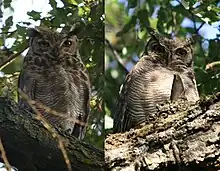Lesser horned owl
The lesser horned owl or Magellanic horned owl (Bubo magellanicus) is a large owl of the genus Bubo found in southern South America, extending north to the central Andes. It has traditionally been classified as a subspecies of the great horned owl (Bubo virginianus), but is now treated as a separate species based on differences in voice and size and because of the genetic distance between the two.[3]
| Lesser horned owl | |
|---|---|
 | |
| Male (left) and female (right) | |
| Scientific classification | |
| Domain: | Eukaryota |
| Kingdom: | Animalia |
| Phylum: | Chordata |
| Clade: | Dinosauria |
| Class: | Aves |
| Order: | Strigiformes |
| Family: | Strigidae |
| Genus: | Bubo |
| Species: | B. magellanicus |
| Binomial name | |
| Bubo magellanicus (Lesson, 1828) | |
It is about 45 cm (18 in) long with birds in the north of the range being largest. It has broad wings and a large head with two "ear" tufts. The plumage is mainly grey-brown but is quite variable in colour. The underparts are pale with narrow grey-brown bars and the breast has dark blotches. There is a black border to the facial disc and white stripes above the yellow eyes. The great horned owl is similar but larger with stronger feet and bill, broader bars on the underparts and longer ear-tufts.[3]
The deep hooting call consists of a double-note followed by a loud, vibrating note. The bird's local name tucúquere is imitative of the call.
The range extends from central Peru and western Bolivia southwards through Chile and western Argentina as far as Tierra del Fuego. The bird occurs in a variety of habitats including open forest, scrubland, farmland and grassland. It hunts over open country, mainly at night. Rodents make up most of the diet but other mammals, birds, reptiles and insects are also taken. The species nests on cliffs or between rocks. The two or three eggs are incubated by the female, who is fed by the male.[3]
References
- BirdLife International (2016). "Bubo magellanicus". IUCN Red List of Threatened Species. 2016: e.T61752097A95179224. doi:10.2305/IUCN.UK.2016-3.RLTS.T61752097A95179224.en. Retrieved 20 February 2022.
- "Appendices | CITES". cites.org. Retrieved 2022-01-14.
- Holt, D.W., Berkley, R., Deppe, C., Enríquez Rocha, P., Petersen, J.L., Rangel Salazar, J.L., Segars, K.P., Wood, K.L. & Marks, J.S. (2019). Magellanic Horned Owl (Bubo magellanicus). In: del Hoyo, J., Elliott, A., Sargatal, J., Christie, D.A. & de Juana, E. (eds.). Handbook of the Birds of the World Alive. Lynx Edicions, Barcelona. (retrieved from https://www.hbw.com/node/55007 on 13 February 2019).
Further reading
- Jaramillo, Alvaro; Burke, Peter & Beadle, David (2003) Field Guide to the Birds of Chile, Christopher Helm, London.
- Marcot, Bruce G. (2006) Prey Remains of Magellanic Horned Owl (Bubo magellanicus) at Perito Moreno, Southern Argentina. Accessed 03/09/07.
- Peterson, Alan P. (ed.) (1999) Zoological Nomenclature Resource (Zoonomen). Accessed 03/09/07.
External links
 Data related to Bubo magellanicus at Wikispecies
Data related to Bubo magellanicus at Wikispecies- Magellanic Horned Owl (Bubo magellanicus)
